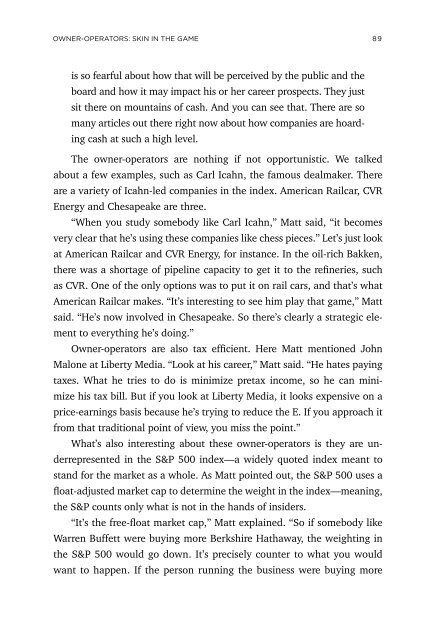Create successful ePaper yourself
Turn your PDF publications into a flip-book with our unique Google optimized e-Paper software.
OWNER-OPERATORS: SKIN IN THE GAME 89<br />
is so fearful about how that will be perceived by the public and the<br />
board and how it may impact his or her career prospects. They just<br />
sit there on mountains of cash. And you can see that. There are so<br />
many articles out there right now about how companies are hoarding<br />
cash at such a high level.<br />
The owner-operators are nothing if not opportunistic. We talked<br />
about a few examples, such as Carl Icahn, the famous dealmaker. There<br />
are a variety of Icahn-led companies in the index. American Railcar, CVR<br />
Energy and Chesapeake are three.<br />
“When you study somebody like Carl Icahn,” Matt said, “it becomes<br />
very clear that he’s using these companies like chess pieces.” Let’s just look<br />
at American Railcar and CVR Energy, for instance. In the oil-rich Bakken,<br />
there was a shortage of pipeline capacity to get it to the refineries, such<br />
as CVR. One of the only options was to put it on rail cars, and that’s what<br />
American Railcar makes. “It’s interesting to see him play that game,” Matt<br />
said. “He’s now involved in Chesapeake. So there’s clearly a strategic element<br />
to everything he’s doing.”<br />
Owner-operators are also tax efficient. Here Matt mentioned John<br />
Malone at Liberty Media. “Look at his career,” Matt said. “He hates paying<br />
taxes. What he tries to do is minimize pretax income, so he can minimize<br />
his tax bill. But if you look at Liberty Media, it looks expensive on a<br />
price-earnings basis because he’s trying to reduce the E. If you approach it<br />
from that traditional point of view, you miss the point.”<br />
What’s also interesting about these owner-operators is they are underrepresented<br />
in the S&P 500 index—a widely quoted index meant to<br />
stand for the market as a whole. As Matt pointed out, the S&P 500 uses a<br />
float-adjusted market cap to determine the weight in the index—meaning,<br />
the S&P counts only what is not in the hands of insiders.<br />
“It’s the free-float market cap,” Matt explained. “So if somebody like<br />
Warren Buffett were buying more Berkshire Hathaway, the weighting in<br />
the S&P 500 would go down. It’s precisely counter to what you would<br />
want to happen. If the person running the business were buying more


